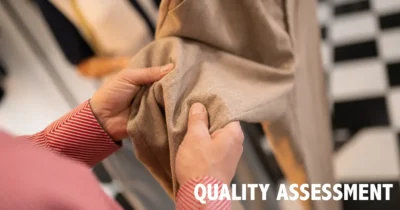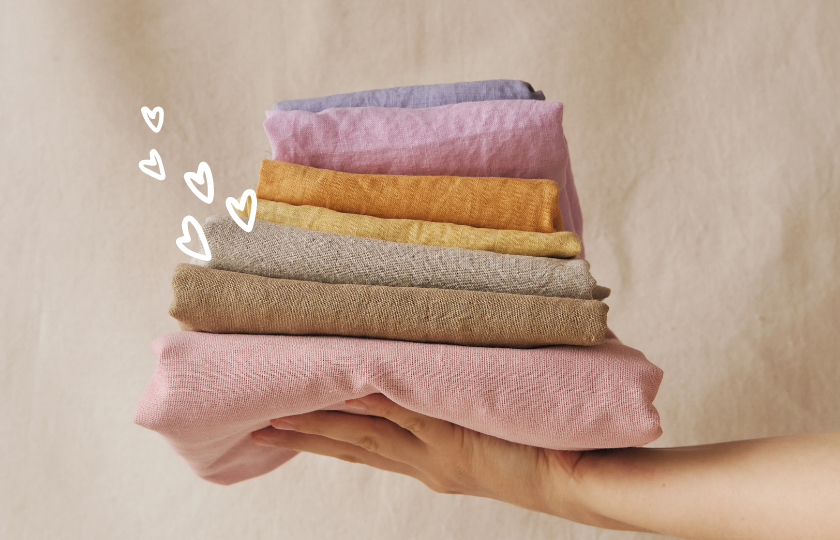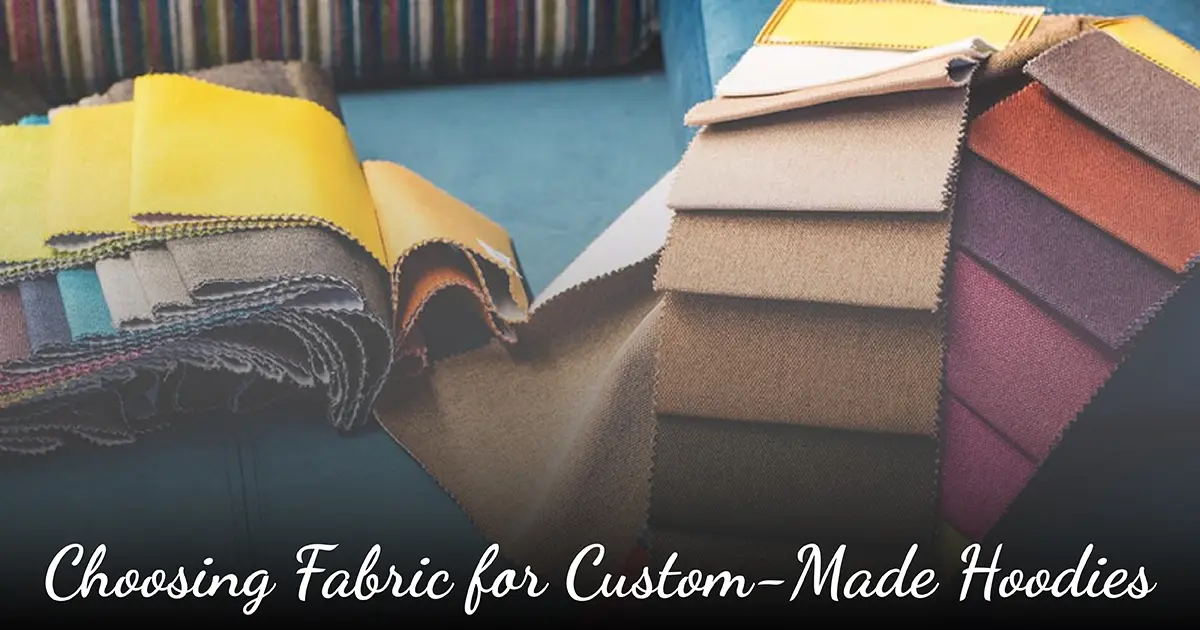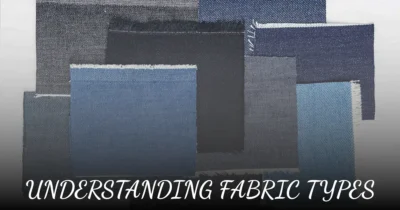When it comes to the realm of custom-made hoodies, the fabric you choose is not just a mere selection; it’s a pivotal decision that influences the overall aesthetics, comfort, and functionality of the final garment. In this detailed guide, we will navigate through the intricacies of selecting the best fabrics for your custom-made hoodies, ensuring that your choice aligns seamlessly with your unique style, preferences, and the practical aspects of the garment.
Embarking on the journey of creating custom-made hoodies requires an understanding of the profound impact fabric selection holds. Beyond merely contributing to the visual appeal, the fabric becomes a key determinant of comfort, durability, and overall style. In this article, we will explore the multifaceted aspects of fabric choices, guiding you through the process of making informed decisions for hoodies that not only look good but also feel exceptional.
Understanding Fabric Types
Before diving into the specifics, it’s imperative to develop a foundational understanding of the common hoodie fabrics available. The market offers an array of options, including cotton, polyester, blends, and specialized fabrics. Each fabric type brings its own set of characteristics to the table, influencing factors such as breathability, durability, and overall feel. Let’s delve into the distinctive traits of each fabric to empower you with the knowledge needed for an informed choice.
Cotton: A Natural Affair
Cotton stands out as a classic choice, known for its breathability, softness, and comfort. Ideal for a wide range of temperatures, cotton hoodies offer a natural feel against the skin. However, it’s essential to note that pure cotton may have limitations in terms of moisture-wicking properties and durability.
Polyester: Durability and Performance
On the opposite end of the spectrum, polyester boasts durability and resistance to wrinkles and shrinking. Polyester is a synthetic fabric that excels in moisture-wicking, making it suitable for those engaged in active pursuits. While it might lack the breathability of cotton, it compensates with its longevity and ease of maintenance.
Blends: The Best of Both Worlds
Blended fabrics, combining elements of cotton and polyester, offer a balanced solution. Blends attempt to marry the comfort of cotton with the durability and performance features of polyester. This category provides a versatile option, catering to those who seek a harmonious blend of softness and resilience.
Specialized Fabrics: Catering to Unique Preferences
Beyond conventional choices, specialized fabrics cater to unique preferences and specific functionalities. Some examples include fleece-lined fabrics for added warmth, spandex blends for stretchability, or moisture-wicking blends for enhanced performance. Understanding these specialized options allows for a more tailored approach to your hoodie selection.
Consideration of Climate and Purpose
While the fabric type lays the foundation for your hoodie, considerations such as climate and intended purpose refine the selection process. The adaptability of the hoodie to different seasons and its performance in varied environments become paramount.
Seasonal Adaptability: From Breezy Summers to Frosty Winters
Hoodies are not confined to a single season, and your fabric choice should reflect this versatility. Lightweight, breathable fabrics like cotton are suitable for mild temperatures, while heavier fabrics or fleece-lined options provide warmth for colder climates. Consider whether your hoodie will be a summer companion or a winter essential, and choose the fabric accordingly.
Performance-Based Requirements: Active Pursuits Demand Specialized Fabrics
If your hoodie is intended for active pursuits, such as jogging or workouts, prioritize fabrics designed for performance. Moisture-wicking properties become crucial in this context, ensuring that sweat is efficiently drawn away from the body, keeping you comfortable during physical activities. Polyester and specialized moisture-wicking blends excel in this arena.

Source: Phys
Balancing Breathability and Insulation: Creating a Hoodie for All Occasions
The balance between breathability and insulation is a delicate consideration. A hoodie that strikes the right equilibrium ensures comfort across a spectrum of temperatures. Fabrics like blended materials or those with added ventilation features contribute to this delicate balance, allowing you to enjoy your custom-made hoodies in various settings.
Quality Assessment
Assessing the quality of a fabric involves delving into the finer details of its construction. Thread count, fabric density, and overall durability are key aspects that influence the longevity and wear resistance of your custom-made hoodies.
Thread Count and Fabric Density: The Foundations of Quality
Thread count refers to the number of threads per square inch in a fabric. A higher thread count often indicates a smoother, more durable material. In the context of hoodies, a moderate to high thread count contributes to a fabric that not only feels soft but also stands up to the rigors of regular wear and washing.
Evaluating Material Durability: Beyond Thread Count
While thread count provides an initial gauge of fabric quality, evaluating the overall durability of the material is crucial. Consider factors such as the thickness of the fabric and its resistance to pilling, shrinking, and fading. A durable fabric ensures that your custom-made hoodies retains its appeal over the long haul.

Ensuring Longevity and Wear Resistance: Invest in a Wardrobe Staple
A custom-made hoodie is not merely a piece of clothing; it’s an investment in your wardrobe. Prioritizing fabrics known for their longevity and wear resistance ensures that your hoodie becomes a staple, capable of withstanding the test of time and maintaining its quality through repeated wears and washes.
Customization Possibilities
While the material itself forms the foundation, customization is where your custom-made hoodie truly becomes an extension of your style. Understanding how different fabrics interact with various customization techniques allows you to make choices that enhance the visual impact of your hoodie.
Dye Sublimation for Unique Designs: Vibrancy Beyond the Fabric
Dye sublimation is a customization technique that allows for intricate and vibrant designs. Understanding how different fabrics absorb color and patterns is crucial when opting for this method. Fabrics with a higher polyester content often showcase colors more vividly, providing a canvas for eye-catching designs and patterns.
Embroidery on Different Fabrics: Precision and Texture
Embroidery is a classic customization option that adds a touch of sophistication to your hoodie. However, not all fabrics are created equal when it comes to embroidery. Fabrics with a tighter weave, such as cotton or blends, often provide a smoother surface for precise stitching. Consider the intended design and how it complements the fabric’s texture.
Choosing Fabrics that Enhance Design Elements: A Collaborative Effort
The synergy between fabric choice and design elements is where customization truly flourishes. Fabrics with unique textures or patterns can enhance specific design features. Consider how your chosen fabric aligns with the overall aesthetic you wish to achieve, ensuring that the material complements and elevates the visual impact of your custom-made hoodies.
Sustainability in Fabric Choices
As the fashion industry undergoes a paradigm shift towards sustainability, your fabric choices contribute to this broader movement. Exploring eco-friendly material options and understanding the environmental impact of different fabrics allows you to make choices that align with a more responsible and ethical approach to fashion.
Eco-friendly Material Options: Navigating Sustainable Choices
Several fabrics fall under the umbrella of eco-friendly options. Organic cotton, for instance, is cultivated without the use of harmful pesticides, promoting soil health and reducing environmental impact. Recycled polyester utilizes post-consumer plastic bottles to create a durable fabric. Exploring these options allows you to align your fashion choices with a commitment to sustainability.
Impact of Fabric Choices on the Environment: Beyond Aesthetics
The environmental impact of fabric choices extends beyond the immediate aesthetic appeal of your custom-made hoodies. Consider the resources used in the production of different fabrics, the energy consumption involved, and the overall carbon footprint. Opting for fabrics with a lower environmental impact contributes to a more sustainable fashion landscape.

Source: viable.earth
Supporting Sustainable Fashion Practices: A Collective Responsibility
Making informed choices about the fabrics in your custom-made hoodies is a step towards supporting sustainable fashion practices. By choosing materials that prioritize environmental responsibility, you contribute to a broader movement within the industry. As consumers increasingly demand transparency and sustainability, your fabric choices become a powerful tool for positive change.
Cost-Effectiveness and Budgeting
While the pursuit of quality is paramount, understanding the balance between quality and affordability is essential. Budget considerations play a role in guiding your fabric choices, and evaluating the long-term value against the initial investment ensures that your custom-made hoodies aligns with both your preferences and financial considerations.
Balancing Quality and Affordability: A Pragmatic Approach
Striking a balance between quality and affordability is a pragmatic approach to custom-made hoodies creation. While premium fabrics often come with a higher price tag, the investment pays off in terms of durability, comfort, and overall satisfaction. Consider your budget constraints and identify fabrics that meet your quality expectations while aligning with your financial considerations.
Understanding the Price Range of Different Fabrics: Informed Decision-Making
Different fabrics come with varying price ranges, influenced by factors such as material cost, production processes, and overall quality. Understanding these price differentials empowers you to make informed decisions based on your budget constraints. Keep in mind that the initial investment in higher-quality fabrics often translates to long-term value.
Long-Term Value vs. Initial Investment: Investing in Wardrobe Staples
Viewing your custom-made hoodies as a long-term investment underscores the importance of balancing initial costs with the value derived over time. While premium fabrics may command a higher price upfront, their durability and enduring appeal contribute to the long-term value of your wardrobe. Consider your hoodie not just as a fleeting fashion item but as a staple that enhances your overall wardrobe.
Conclusion
In conclusion, the process of choosing the best fabrics for your custom-made hoodies is a nuanced journey that involves thoughtful considerations at every step. From understanding the distinct traits of different fabric types to evaluating their performance in diverse climates and purposes, the choices you make contribute to a garment that transcends the ordinary. Quality assessment, customization possibilities, sustainability considerations, and budgeting further refine the selection process, ensuring that your custom-made hoodies becomes a personalized masterpiece that aligns with your style, values, and long-term wardrobe aspirations. By delving into the intricacies of fabric choices, you not only craft a hoodie but also curate an experience that seamlessly blends comfort, style, and individuality.



